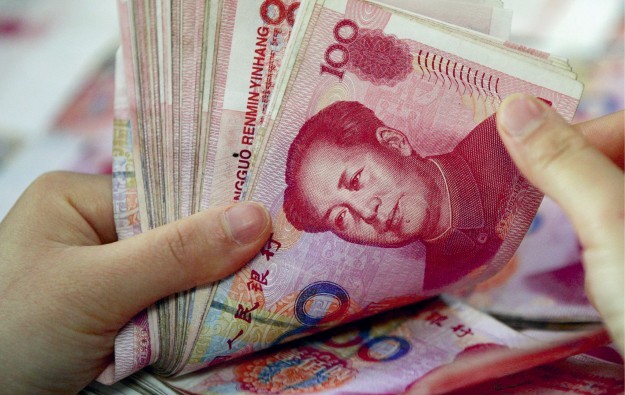Not clear China anti-graft drive is finished: Bernstein
May 23, 2017 Newsdesk Latest News, Macau, Top of the deck

There is “no guarantee” that China’s anti-corruption measures will, as some commentators have suggested, continue to moderate in intensity, said a Tuesday note from an investment brokerage covering the Macau casino industry.
“There is no guarantee that the anti-corruption campaign continues to soften; it could intensify again,” said the memo from Sanford C. Bernstein Ltd.
“We have repeatedly highlighted the policy risks that can create headwinds for Macau’s gaming sector,” added its analysts Vitaly Umansky, Zhen Gong and Yang Xie.
“Over the past year, the anti-corruption campaign appears to be moderating … However, in March and April 2017, we noticed a small spike in anti-corruption related activity. It is too early to call this a new trend, but it could indicate slowing of the moderation, and may in fact be a pick-up in activity (perhaps as we head into the [National People’s] Congress meeting this autumn),” said the Sanford Bernstein team.
“A step-change may be evident in 2018 after the November 2017 Communist Party and Chinese government reshuffle,” the note added.
Earlier this month it was announced that facial recognition technology would soon be installed in automated teller machines (ATMs) in Macau, aimed at holders of mainland-issued China UnionPay Co Ltd bank cards. A number of investment analysts said it was an indication of the authorities’ interest in moderating the flow of money from the mainland to Macau. But several brokerages said it was not clear whether it would have that effect.
In April, Sanford Bernstein had said in a report that during the period March 2013 to March 2017, those months with the highest numbers of announced investigations by China’s Central Commission for Discipline Inspection – the body that investigates allegations of graft made against cadres of the ruling Communist Party of China – were frequently months where Macau VIP casino gross gaming revenue (GGR) had registered year-on-year declines, or some moderation in demand.
Concession risk
In other developments, a Monday note from Japanese brokerage Nomura gave some commentary on risk regarding whether Macau’s six casino operators would be able to stay in the market once their current respective concessions and sub-concessions expire on various dates in either 2020 or 2022.
Referring to Macau Law 16/2001, which sets out the legal basis for Macau’s casino industry, Nomura’s analysts wrote: “While the legal framework does imply challenges, our base case assumption remains that there won’t be any significant changes in the regulatory environment.”
Reasons Nomura cited included that “Macau casinos’ ROIC [returns on invested capital] have deteriorated to levels in line with global peers at approximately 20 percent; among all of the major gaming jurisdictions, Macau has the highest [gaming] tax rate [compared to casino peers]; most of the land concessions granted for casino development won’t expire until 2030 or beyond; [and] most of the major casino operators are already operating in Macau”.
In a separate note on Monday, Nomura said that in the first 21 days of May the month’s casino GGR was on track for 15 percent to 17 percent growth year-on-year.
The Japanese brokerage said it estimated casino GGR of MOP4.85 billion (US$604.7 million) for the May 15 to 21 period, “which implies a daily average of MOP692 million (up 26 percent week-on-week)”. It added that daily average in the previous week of the month had been negatively affected by the visit to Macau of Chinese politburo member Zhang Dejiang, chairman of the National People’s Congress.
Other brokerages also mentioned the likely brief moderating effect on May casino GGR of Mr Zhang’s visit. Nonetheless, Sanford Bernstein said that – with reference to daily run rates up to Monday – it expected Macau’s May casino GGR to increase year-on-year by 14 percent to 16 percent, compared to its previous estimate of 12 percent to 14 percent.
Christopher Jones of the Buckingham Research Group Inc said in a Monday note it was increasing its May year-on-year growth estimates from 14 to 16 percent to between 18 and 20 percent, “based on improving trends versus last week, and better than expected performance during Golden Week,” the latter being a reference to a Chinese holiday period surrounding the May 1 Labour Day.
David Bain of Aegis Capital Corp said in a Monday note he anticipated May growth would be 17 percent to 20 percent, compared to its previous estimate of 15 percent to 19 percent.
Related articles
-
 Some players avoiding Macau amid cash...
Some players avoiding Macau amid cash...Jul 02, 2024
-
 Thai casinos opportunity has risk...
Thai casinos opportunity has risk...Jun 05, 2024
More news
-
 Donaco EBITDA up y-o-y to above US$4mln...
Donaco EBITDA up y-o-y to above US$4mln...Jul 26, 2024
-
 HK listed Palasino upgrades Czech...
HK listed Palasino upgrades Czech...Jul 26, 2024
Latest News
Jul 26, 2024
Border-casino operator Donaco International Ltd has achieved a 164.17-percent year-on-year increase in its latest quarterly group earnings before interest, taxation, depreciation and amortisation...Sign up to our FREE Newsletter
 (Click here for more)
(Click here for more)
Pick of the Day
”We’ve got more traction outside of Macau at the moment. But Macau’s going be a bigger focus for us”
David Punter
Regional representative at Konami Australia
Most Popular
 Sheraton brand to exit Londoner Macao, to be Londoner Grand July 25, 2024
Sheraton brand to exit Londoner Macao, to be Londoner Grand July 25, 2024  Macau regulator probes unlicensed gaming agents July 24, 2024
Macau regulator probes unlicensed gaming agents July 24, 2024  Philippines gives 20k aliens in POGOs 60 days to leave July 25, 2024
Philippines gives 20k aliens in POGOs 60 days to leave July 25, 2024  Philippines-listed DigiPlus says not affected by POGO ban July 24, 2024
Philippines-listed DigiPlus says not affected by POGO ban July 24, 2024  Sands China 2Q EBITDA down q-o-q amid low hold, renovation July 25, 2024
Sands China 2Q EBITDA down q-o-q amid low hold, renovation July 25, 2024






